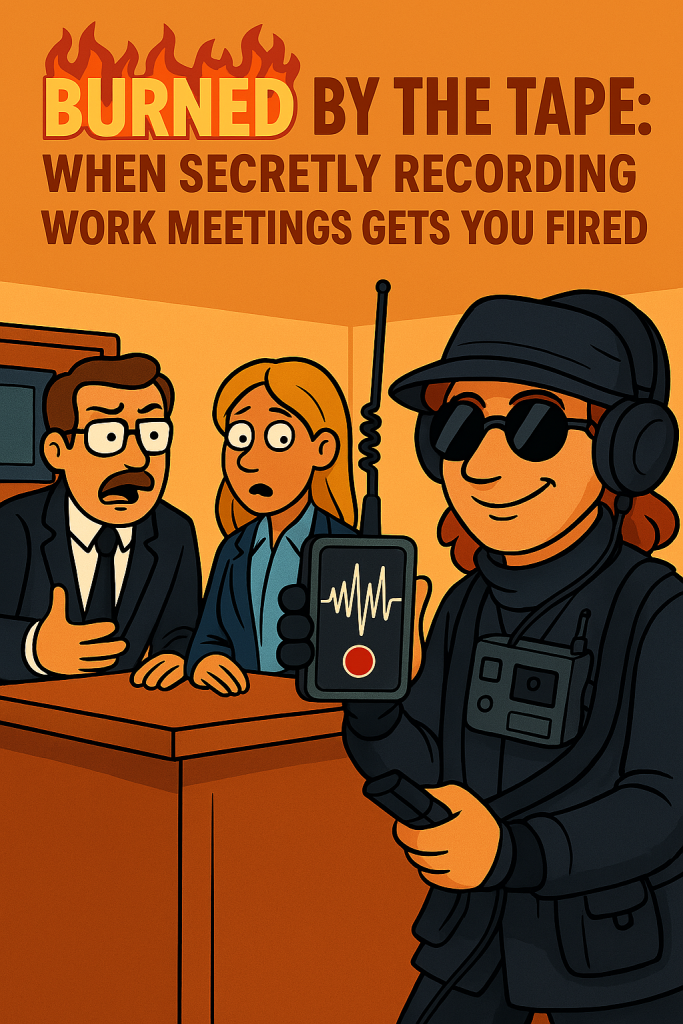Search
Burned by the Tape: When Secretly Recording Work Meetings Gets You Fired

Employees might think pressing record is harmless—especially when trying to document what’s said in a heated meeting. But one Director of Social Services found out the hard way that secret recordings—even legal ones—can land employees on the unemployment line.
TL;DR: A federal appeals court sided with an employer that fired a director who secretly recorded leadership meetings. Even though the company didn’t have a policy against recording, it still had clear, well-documented reasons for the termination that had nothing to do with her complaints about patient care. The court said it wasn’t retaliation—it was a breakdown in trust.
Inside the Meltdown: What Sparked the Lawsuit
The case involved a Director of Social Services who had raised concerns about patient care, cultural insensitivity, and inappropriate behavior by her supervisor. She shared these complaints informally and during a meeting with HR, where she also revealed she had been secretly gathering evidence—including audio recordings of closed-door leadership meetings. On top of that, she had ongoing attendance issues, told a colleague she was job hunting, and even floated the idea of staging a mass resignation unless her supervisor was fired.
The employer investigated, and after learning about the recordings and other concerns, HR leadership decided to terminate her employment. She sued, claiming retaliation.
No Policy? No Problem—for the Employer
Ohio law allows one-party consent for recordings, and the employer had no rule prohibiting them. Still, the company argued that the recordings—made during closed-door director meetings—created distrust, disrupted communication, and risked exposing patient health information.
That was enough. The court made clear that the absence of a formal policy didn’t undermine the employer’s defense. In at-will employment, it’s not just about whether a rule exists—it’s about how the behavior affects the workplace. Secretly recording sensitive discussions raised red flags about judgment and risk. That’s a legitimate business concern, even without a handbook violation.
Why It Wasn’t Retaliation
The employee had raised concerns about resident care—a protected activity under the law. But a retaliation claim takes more than that. The employee has to prove the firing happened because of the complaint.
Here, the court said the employer had plenty of other, unrelated reasons to let her go: attendance problems, early departures, talk of quitting, and the secret recordings. The HR executive who made the final decision didn’t just rely on the complaint—she relied on facts that were documented and serious. That was enough to defeat the retaliation claim.
Three (Well, Four) Takeaways for Employers
- You don’t need a policy to act.
If an employee’s conduct breaks trust or disrupts your team, you can take action—even if it’s not addressed in your handbook. After all, it would be impossible for any employee manual to anticipate and spell out every scenario that might warrant disciplinary action. - Be consistent—or be clear.
If others haven’t been disciplined for similar behavior, be ready to explain why this case is different. Inconsistency without a rationale can raise red flags. - Protected doesn’t mean untouchable.
Complaints about workplace issues are protected, but they don’t immunize employees from unrelated performance or conduct consequences. - Watch for NLRB implications.
The National Labor Relations Board has taken the position that recording workplace meetings may be protected under federal labor law in certain contexts—particularly if employees are documenting working conditions or employer misconduct. Before taking action, consider whether the recording might fall under protected concerted activity.
The Bottom Line
Trust isn’t just a vibe—it’s a legitimate business interest that courts take seriously. When it breaks down—especially due to behavior that disrupts communication or introduces risk—employers can and should act. Just make sure your reasons are clear, well-documented, and grounded in facts, not feelings.
 The Employer Handbook Blog
The Employer Handbook Blog


